Research﹀
-
Latest Activities NSE International Conference NSE Symposium/Winter Camp
-
Objectives and Actions Working Groups Database Reports & Publications Governance and Partners Events Policy Briefing
The Tenth International Workshop on NSE Successfully Held
2023-12-22
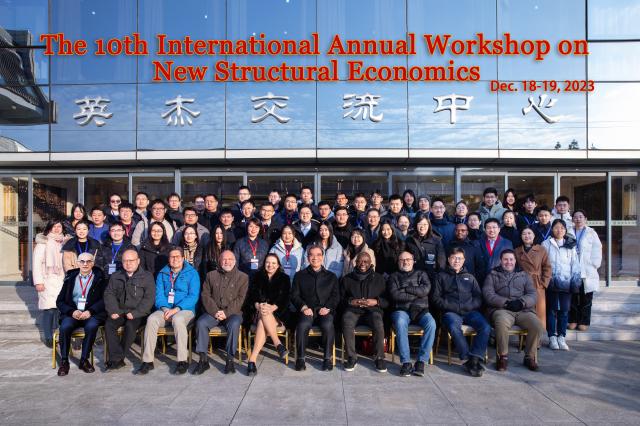
The Tenth International Annual Workshop on New Structural Economics (NSE) was successfully held in Peking University on December 18 to 19, 2023. The Workshop, hosted by the Institute of New Structural Economics (INSE) at Peking University, brought together worldwide scholars to exchange research ideas and findings on four main subjects including “Trade & Knowledge Diffusion”, “Macroeconomics”, “Growth & Development” and “Equity & Inclusion”.
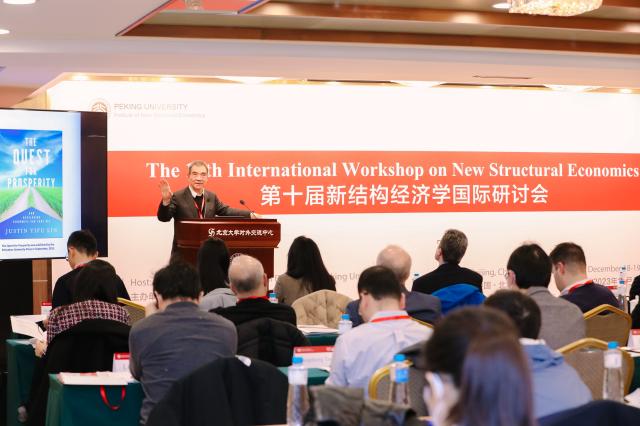
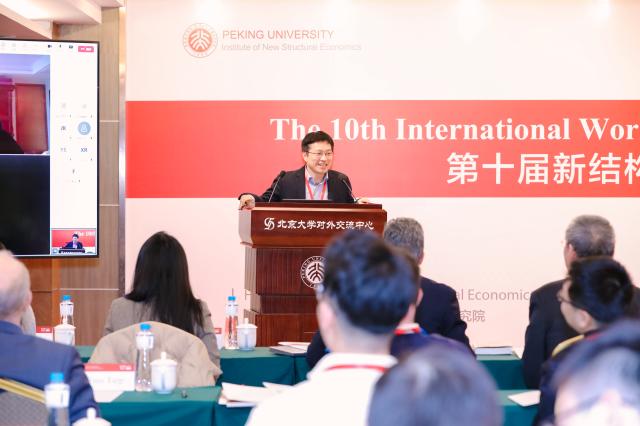
At the opening session on December 18, Professor Justin Yifu Lin, Dean of INSE at Peking University, gave a short opening remark, expressing sincere gratitude to the participants for their support. He systematically introduced the framework and significance of new structural economics, and looked forward to the prospect of the development of new structural economics. Associate Professor Yong Wang, Academy Deputy Dean of INSE at Peking University and Secretary-General of New Structural Economics Research Alliance, chaired the opening session.
In the morning of December 18, Beijing time, session A “Trade & Knowledge Diffusion” was chaired by Mingzhi (Jimmy) Xu, Assistant Professor at Peking University. Four papers were discussed in this session.
Giovanni Peri, Professor at University of California, Davis, presented a paper entitled “Measuring and Predicting New Work in the US: The Role of Local Factors and Global Trends”. This paper measures and characterizes new work 1980-2010, across occupations and across commuting zones, examines how new work relates to employment growth, innovation and workers/jobs characteristics. They also measure main local agglomeration variables and exposure to national shocks and use them to predict new work. Assistant professor Chuan He of Huazhong University of Science and Technology gave comments.
Haochen Zhang, Ph.D. student at Peking University, presented a paper entitled “Learn, in Order to Practise: The Effect of Political Rotation on Local Comparative Advantage in China”. This paper examines the impact of political rotation on interregional knowledge diffusion and yields evidence indicating that the appointment of a new city party secretary (PS), who serves as the leader of the local Chinese Communist Party (CCP) organization, is associated with a significant increase in the revealed comparative advantage (RCA) in industries where the PS's previous work location exhibited better performance. Associate professor Dany Bahar of Brown University gave comments.
Dany Bahar, Associate Professor at Brown University, presented a paper entitled “Talent Flows and the Geography of Knowledge Production: Causal Evidence from Multinational Firms”. This paper explores the role that inventor mobility plays in the global innovation trends. Using migration reforms adopted in 15 countries over the period from 1990 to 2016, this paper finds that positive migration reforms increase innovation and negative reforms decrease it. Ph.D. student Haochen Zhang of Peking University gave comments.
Keun Lee, Professor at Seoul National University, presented a paper entitled “Institutions versus Big Businesses for Entrepreneurship: New Firm Creation and Growth in China”. This paper studies on entrepreneurship in China compares the relative importance of institutions with that of a new and less studied variable—big businesses and finds no evidence of a net barrier to entry effect of large firms on new firm creation, which implies that positive spillover effects tend to offset negative barrier to entry effects on new firm creation. Assistant professor Ninghui Li of Nankai University gave comments.
Session B
In the afternoon of December 18, Beijing time, session B “Macroeconomics” was chaired by Shenzhe Jiang and Yiqing Xiao, Assistant Professor at Peking University. Five papers were discussed in this session.
Visiting professor Célestin Monga of Harvard University and Bouba Housseini of International Development Research Centre presented a paper entitled “Hysteresis, Aid, and Governance: Theories and Empirics from Africa”. This paper questiones the presumptions of benevolence and neutrality of aid, and examined the pervasiveness of aid influence on public policy and its implications for the quality of governance. Alexandre Kopoin of African Development Bank gave comments.
Ann Harrison,Professor at University of California, Berkeley, presented a paper entitled “Disentangling the Various Explanations for the Declining Labor Share: Evidence from Forty Million Firm Records”. This paper identifies impact of different factors driving labor share changes across 40+ countries and finds that market power, technological change, and globalization are the three major factors. Associate Professor Jing Cai of University of Maryland gave comments.
Kimminori Matsuyama, Professor at Northwestern University, presented a paper entitled “Love for variety” online. This paper study how love-for-variety, -- productivity (or utility) gains from increasing variety of differentiated inputs (or consumer goods) --, depends on the underlying demand structure. Professor Bo Zhang of Peking University gave comments.
Santiago Levy, the Senior Fellow at The Brookings Institution, presented a paper entitled “Dysfunctional Firm Dynamics and Mexico's Dismal Productivity Performance”. This paper exploits a very rich data base to carry out a dynamic productivity decomposition from two perspectives on the composition of the economy. And they find that the main proximate reason for the fall in TFP was dysfunctional firm dynamics and the formal-informal composition of the economy matters more than the sector composition. Professor Keun Lee of Seoul National University gave comments online.
Jianjun Miao, Professor at Boston University, presented a paper entitled “Capital Income Jumps and Wealth Distribution”. This paper develops a tractable macro framework with exponential-tailed wealth distribution and derives a analytical solution to highlight how capital income jump risks affect the wealth distribution. And they also explore the implication of capital taxation (and taxing the super-rich). Professor Shenghao Zhu of University of International Business and Economics gave comments.
Session C
In the morning of December 19, Beijing time, session C “Growth and Development” was chaired by Lijun Zhu, Assistant Professor of INSE at Peking University. Four papers were discussed in this session.
Ping Wang, Professor at Washington University in St. Louis, presented a paper entitled “Britain-China Trade, Opium Wars and Bans, and the Colonization of Hong Kong: A Staged-Development Approach”. The paper suggests the international trade pattern and political economy cause behind the first and second Opium War by a staged-development model, and gives counterfactual analysis under certain parameters. Rongsheng Tang, Associate Professor at Liaoning University, discussed the paper.
Yongseok Shin, Professor at Washington University in St Louis, presented a paper entitled “The Plant-Level View of an Industrial Policy: The Korean Heavy Industry Drive of 1973”. The paper analyses the effect of heavy industry policy in Korea on the establishment size, TFP, and allocation efficiency of targeted and non-targeted industries by plant-level data. Ying Feng, Assistant Professor at National University of Singapore, discussed the paper.
Xuewen Liu, Professor at Hong Kong University, presented a paper entitled “Consumption-led Industrial Upgrading”. This paper introduces a growth model with interaction between consumption upgrading and industrial upgrading. Linyi Cao, Assistant Professor at Shanghai University of Finance and Economics, discussed the paper.
Kaiji Chen, Associate Professor at Emory University, presented a paper entitled “Preferential Credit Subsidy with Sectoral Markup Heterogeneity”. The paper suggests that sectors with higher markups are likely to receive credit subsidy, and the sectoral-specific preferential policies can be used to improve aggregate productive efficiency by reducing sectoral markup dispersion, despite the inefficiency introduced by lower firm entering and exiting. Helu Jiang, Assistant Professor at Shanghai University of Finance and Economics, discussed the paper.
Session D
In the afternoon of December 19, session D “Equity and Inclusion” was chaired by Chunzan Wu, Assistant Professor of INSE at Peking University. Four papers were discussed at this session.
Rachel Ngai, Professor from London School of Economics and Political Science, presented a paper entitled “ Structural Transformation over 150 Years of Women's and Men's Work”. The paper examined the evolution of employment for women and men through a structural transformation perspective, noting a U-shaped trend in women's employment due to declines in agriculture and rises in service industries, in contrast to a steady decline in male employment linked to decreases in agriculture and manufacturing sectors. Several scholars offered comments and discussions on this paper.
Branko Milanovic, professor at City University of New York, presented a paper entitled “The Three Eras of Global Inequality, 1820-2020 with The Focus on the Past Thirty Years.” This paper segmented two centuries of global income inequality into three main phases, highlighting that future trends in global inequality are more dependent on changes in India and African nations than China. Li Yang, researcher at Leibniz Centre for European Economic Research provided commentary.
Finn Tarp, professor from University of Copenhagen, presented a paper entitled “Using Role Models to Inspire Marginalized Groups: A Cautionary Tale.” The paper explored empirical evidence on the impact of role model interventions, finding no effect on business activities and a potential decrease in income for households exposed to ethnic minority role models. Branko Milanovic, Professor at City University of New York commented on the paper.
Partha Dasgupta, professor from University of Cambridge, presented a paper entitled “Economic Development the Anthropocene.” This paper addresses the profound impact of economic activities on the Earth's biosphere since the mid-20th century. He emphasizes the significant increase in global GDP and population, juxtaposed against the decline in natural capital, such as forests, wetlands, and biodiversity. The paper critically assesses the traditional GDP-centric view of economic growth, highlighting the urgent need for sustainable development strategies that balance economic growth with environmental protection. Justin Yifu Lin, Dean of INSE at Peking University, commented on the paper.
At the end of the conference, Professor Justin Yifu Lin expressed his sincere gratitude to all participants and highly praised the 17 papers presented by economists from around the world. He eagerly looks forward to collaborating with colleagues in the future to jointly devote efforts to studying China's economic miracle, caring for the well-being of all humanity, and continuing to strive for in-depth research on economic development and structural transformation.
The Sixth Academic Advisory Council Meeting Held
INSE held its Sixth Academic Advisory Council Meeting on December 19. Yong Wang, Academic Deputy Dean of INSE at Peking University and Secretary-General of New Structural Economics Research Alliance, chaired the meeting. At the beginning of the meeting, Professor Yong Wang introduced the research agenda of and outcomes achieved by INSE. Members of the Academic Advisory Council then offered insightful suggestions for the future development of INSE.
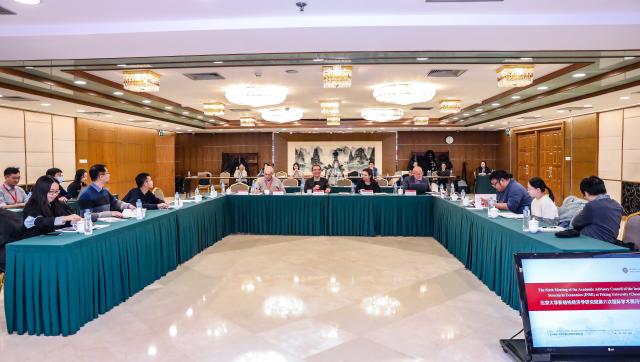
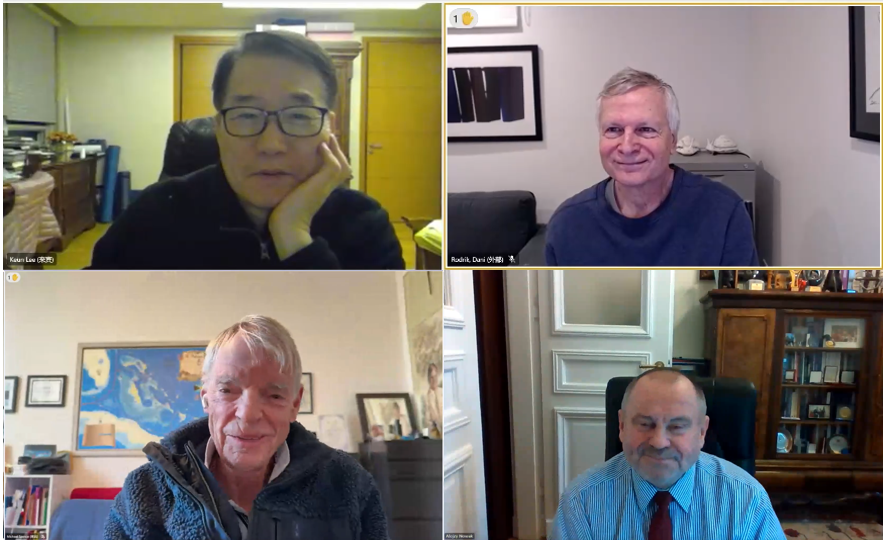
The Academic Advisory Council of INSE, composed of internationally-renowned scholars and experts, meets annually and provides advice on INSE's research activities. Attendees this year included Ann Harrison, Dean of the Haas School of Business at University of California, Berkeley; Keun Lee, Distinguished Professor at the Seoul National University (Econ. Dept); Santiago Levy, non-resident Senior Fellow at The Brookings Institution; Celestin Monga, Visiting Professor of Public Policy at Harvard's Kennedy School of Government; Alojzy Z. Nowak, Professor and Rector of University of Warsaw; Dani Rodrik, Ford Foundation Professor of International Political Economy at Harvard's John F. Kennedy School of Government; Michael Spence, Nobel Laureate and Philip H. Knight Professor of Economics and Dean of the Stanford Business School,Emeritus, Finn Tarp, Professor of Development Economics at the University of Copenhagen and Ping Wang, Seigle Family Distinguished Professor at Washington University in St. Louis.
Written by Weibin Wei, Ruize Tian, Si Chen, Zhiyuan Li

